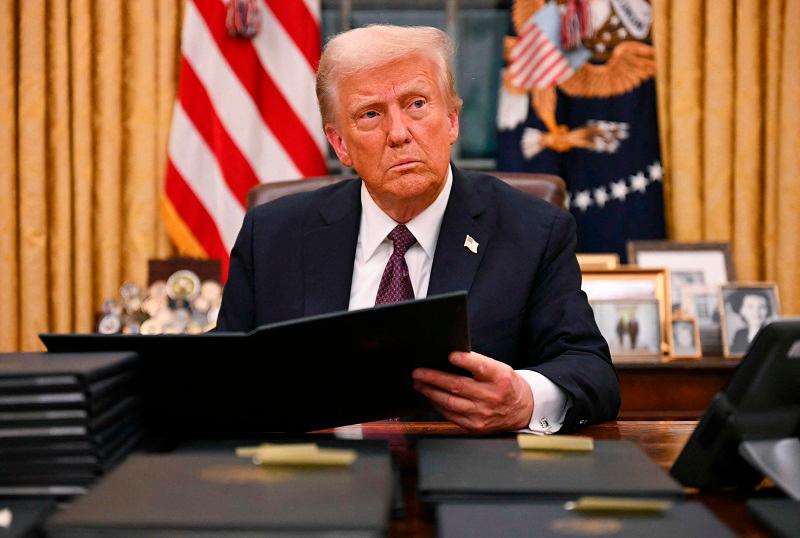DONALD Trump has always been a polarising figure but his return to the White House with a flurry of over 100 executive orders feels like an audacious spectacle, even by his standards.
Love him or loathe him, the former real estate mogul turned political juggernaut has begun reshaping the United States’ domestic and foreign policies at breakneck speed. His actions reflect a man determined to leave an indelible mark while blatantly erasing the legacy of his predecessor Joe Biden.
Trump’s executive orders are not just policy statements, but rather they are declarations of intent. Most of them are direct reversals of Biden-era initiatives, a deliberate swipe at the senior statesman he has openly criticised as weak and ineffective.
The speed with which he has dismantled Biden’s policies, from energy to taxation and trade, shows not only his disdain for the past administration but also his intent to solidify his vision of “America First”. Whether this vision will lead to prosperity or chaos remains to
be seen.
One of Trump’s most striking actions has been his withdrawal of US support for global corporate tax reforms. Biden had championed international collaboration to establish a global minimum corporate tax rate, a landmark effort aimed at curbing tax evasion by multinational companies.
Trump’s decision to abandon this accord not only jeopardises years of negotiations but also sets the stage for a fragmented international tax landscape. Nations like France and India may now reinstate digital services taxes, further straining trade relations and destabilising cross-border investments.
Trump’s disdain for Biden’s environmental policies is even more apparent. His declaration of a “national energy emergency” prioritises fossil fuel development over clean energy, effectively reversing US commitments under the Paris climate agreement.
This move is likely to strain relations with global allies focused on combatting climate change, leaving the US increasingly isolated in environmental diplomacy.
Domestically, it sets the stage for clashes with environmentalists and legal challenges that could drag on for years.
Trump’s economic policies have been equally disruptive. His announcement of potential 25% tariffs on imports from Canada and Mexico is a bold, if not risky, attempt to tilt North American trade in favour of the US.
Such measures risk disrupting supply chains, increasing costs for businesses and consumers and triggering retaliatory actions.
China, however, remains Trump’s ultimate trade adversary. He has proposed a 10% punitive tariff on Chinese imports and is considering revising the exemption which allows low-value imports to enter the US
duty-free.
These measures, while ostensibly aimed at addressing trade imbalances, could severely disrupt global supply chains and escalate tensions between the world’s two largest economies.
In contrast to his combative approach with Canada, Mexico and China, Trump has extended an olive branch to India.
Efforts are underway to arrange a meeting between Trump and Indian Prime Minister Narendra Modi, with discussions focusing on strengthening trade ties and facilitating skilled worker visas for Indian citizens.
India, eager to attract US investment, has shown willingness to offer concessions, creating an opportunity for mutual economic gain.
While Trump’s policies have generated optimism in some sectors, they have also introduced significant volatility.
His unveiling of the US$500 billion “Stargate” AI project, a partnership with tech giants like Oracle, OpenAI and SoftBank, has spurred rallies in AI-related stocks.
This ambitious initiative to bolster US AI infrastructure reflects Trump’s recognition of technology’s central role in economic growth and national security.
However, other sectors have not fared as well. Apple, for instance, has faced a decline in its stock price amid concerns over iPhone sales in China. Broader market reactions to Trump’s announcements underscore the unpredictable terrain he is creating.
Even Wall Street stalwarts like JPMorgan Chase CEO Jamie Dimon have voiced concerns about inflated asset prices, cautioning that geopolitical tensions and economic risks could undermine long-term stability.
Trump’s presidency continues to be a study in contradictions. He dismantles policies as swiftly as he builds new initiatives, often leaving allies and adversaries scrambling to adapt.
His energy policies hark back to a bygone era of fossil fuel dominance even as he champions cutting-edge AI technologies.
His trade policies pit him against China
and traditional allies, yet he seeks closer ties with India.
I find myself torn, just as I was during the 1.0 era. There is an undeniable brilliance in Trump’s ability to dominate the narrative, to reshape not just policies but the way the world perceives America.
Yet, there is also a recklessness to his approach, a willingness to alienate allies, disregard long-term consequences and court chaos for the sake of short-term wins.
Watching Trump is like watching a storm. There is a certain awe in the sheer force of his actions but also a deep concern for what might be left in his wake. His presidency is not just about governance, it is about reshaping history, one executive order at a time.
Whether Trump’s actions will propel the US to new heights or lead to irreversible damage is a question only time will tell.
For now, we are all spectators to a presidency that continues to confound, astonish and divide in equal measure.
Dr Bhavani Krishna Iyer holds a doctorate in English literature. Her professional background encompasses teaching, journalism and public relations. She is currently pursuing a second master’s degree in counselling.
Comments: letters@thesundaily.com










